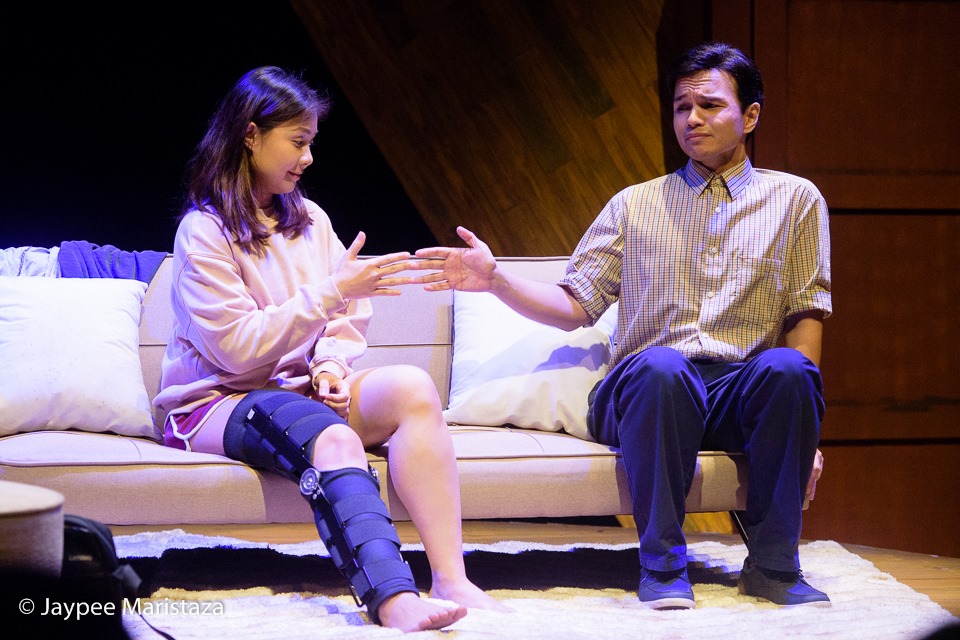
REVIEW: “Dancing Lessons” is a typical staging of atypical love
The last time I saw Randy Villarama on stage, he was playing a man with a speech impediment in dragging period comedy Baka Naman Hindi. It was the sort of problematic depiction that would make you want to wonder why he’d take on another role that requires a particularly delicate and empathetic hand to portray fairly. Mercifully, his take as a man living with Asperger’s Syndrome doesn’t offend, though it does lack the nuance required to make this Francis Matheu-directed play a purposeful thing to aid local autism awareness.
If it is medically accurate, I’m not equipped to say. There’s a rigidity in his performance that I suppose is a marker for this specific type of syndrome, (Although the show does note that the term is no longer recognized, and people with such symptoms are considered part of the autism spectrum.) but it was an uneven performance that it wasn’t easy to glean the person he’s supposed to be portraying beyond the Asperger’s. Should Matheu have tried to find an actor with Asperger’s for the role? I admit it’s a slippery slope to start clamouring for such representation when the odds of finding a local theater actor that fits the bill I assume would be astronomical. But part of the goal is awareness, as evidenced by talkbacks with medical professionals after the show. Awareness is difficult when what’s on stage is a depiction that is lacking.

Randy Villarama as Ever Montgomery; photo by Jaypee Maristaza
Villarama isn’t entirely to blame for what ultimately had been a middling show. Saturday’s evening performance had a couple of mics taped on the circular stage, which did nothing to aid in modulating the voices of the actors. They had to work to be audible, and you can’t portray tender, sensitive, naturalistic human connection while straining to modulate your voice for a space as large as Power Mac Center’s blackbox.
Written by Mark St. Germain, “Dancing Lessons” is a two-character one-act between two different people finding human connection. Villarama’s character, Ever, seems a respected professor fighting climate change, and we see him give lectures that are disconnected from the rest of the plot. His need to learn how to dance for an awards night gives the show a premise, and he asks injured dancer Senga (Jill Peña) for lessons. She initially rebuffs him, but promise of easy money for easy work, and without much else going on in her life, she accepts. They begin to learn about each other, like Ever’s problems with touch and Senga’s denial that her injury might be more permanent than she assumes.

Jill Peña as Senga; photo by Jaypee Maristaza
They’re two complicated people who meet at a complicated time in their lives. For Senga, Kayla Teodoro’s set design fills us in on the character’s life with more clarity than Peña’s performance. For a dancer whose life and livelihood seemed practically permanently altered by an injury, Peña doesn’t deliver the congruent intensity of someone in such a situation.
The would-be odd-couple tension between this fallen dancer and this man on the autism spectrum doesn’t last for very long, nor was it particularly memorable. Ever, once so averse to touch that he’s petrified of a handshake, and Senga, annoyed by her strange neighbor’s oddities and persistence, were suddenly doing a lot more than dance lessons without the impact of these seismic changes in their personalities being shown all that clearly.
Tickets: Php 750.00 - Php 1,550.00 Show Dates: August 16 ’19, August 17 ’19, August 21 ’19, August 22 ’19, August 23 ’19, August 24 ’19 Venue: Power Mac Center Spotlight, Circuit, Makati Running Time: approx. 1 hour and 30 minutes (no intermission) Credits: Mark St. Germain (playwright), Francis Matheu (director), JM Cabling (choreographer), Kayla Teodoro (scenic design), Joseph Matheu (lighting design), Joyce Garcia (video graphic design), Arvy Dimaculangan (sound design) Cast: Jill Peña, Randy Villarama, Marielle Baylocon, Al Bernard Velarde Garcia Company: Twin Bill Theater

